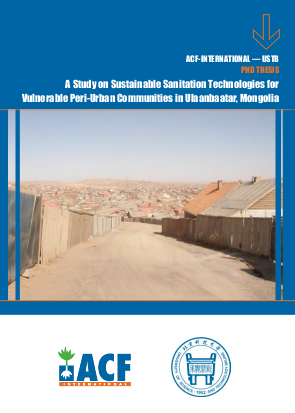PhD Report

In many of the world’s undeveloped or partially-developed countries, and even in some developed ones, frequent outbreaks of various water, sanitation and hygiene (WASH)- and greywater-borne diseases are still prevalent due to lack/absence/failure of WASH system. As a result, poor sanitation accounts for the death of a child every 20 seconds which leads to 1.5 million preventable death each year. Therefore development of alternative sanitation technologies which are sustainable can be a problem-solver in the field of WASH, can be one of the options to tackle the WASH- and greywater- borne challenges around the world including Mongolia. This study was carried out for the first time in the coldest capital in the world, namely Ulaanbaatar, Mongolia during the period of 2012 and 2014 to assess technical feasibility, replicability and social acceptability of various sustainable sanitation technologies (e.g. eco-toilets, greywater and human feces treatment technologies) for the vulnerable communities.
Resource collections
- UN Habitat - Urban Response Collection
- Urban Response - Urban Crisis Preparedness and Risk Reduction
- Urban Response Collection - Community Engagement and Social Cohesion
- Urban Response Collection - Economic Recovery
- Urban Response Collection - Environment and Climate Change
- Urban Response Collection - Housing, Land and Property
- Urban Response Collection - Urban Crisis Response, Recovery and Reconstruction
- Urban Response Collection - Urban Resilience